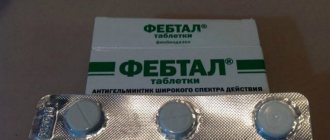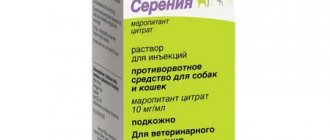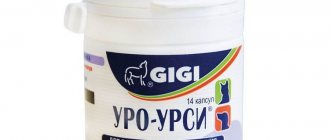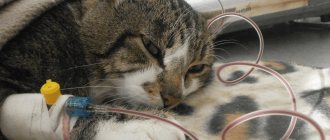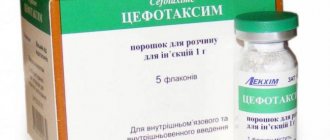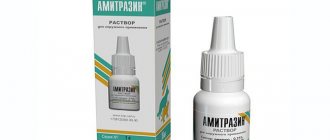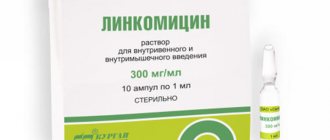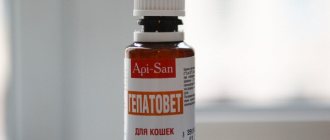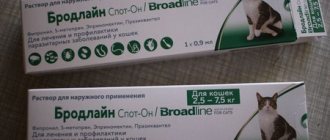Sooner or later, many pet owners are faced with diseases that are caused by ectoparasites (ticks, lice eaters, fleas) in animals. Blood-sucking insects can enter an apartment from the entrance or on the owners’ shoes and attack even those cats that live exclusively at home.
Measures to treat your pet should be taken after consultation with a veterinarian. If the presence of parasitosis is established, then, most likely, a specialist will recommend using the drug Otodectin to treat the animal (the instructions contain recommendations on dosages of the drug for cats, dogs, and fur-bearing domestic animals).
Composition and release form
The medication is available in the form of an injection solution. The colorless and transparent sterile liquid is packaged in plastic bottles or glass ampoules. The volume can be different - from 1 to 20 ml. When purchasing medicine for cats, choose small-volume packaging, since doses are calculated based on weight.
The main active ingredient is ivermectin, which has a detrimental effect on various types of parasites. The concentration of the substance is small - only 1 mg per 1 ml of solution, which makes the medicine safe for animals.
The composition includes triethylene glycol and isopropanol as additional components.
Pharmacological properties
The instructions for use characterize “Otodectin” (for cats) as a product that has an antiparasitic effect. Ivermectin, which is part of the drug, copes well with nematodes, demodectic and sarcoptic mites, as well as insects that parasitize carnivores. The active substance has an effect on parasites through the membranes of their muscle and nerve cells. The main target of their body is glutamate-sensitive chloride channels. The drug destroys chlorine ions. Thus, it causes paralysis and death of harmful inhabitants living on the animal.
The instructions for use describe “Otodectin” for cats as a drug that begins to be absorbed into the tissues and organs of the animal immediately after administration. It lasts for ten to twelve hours. After which it is completely eliminated from the body along with swords and bile. In lactating animals, the final substances may be excreted in milk. When used wisely, the drug will not have a negative effect on the animal’s body or the environment. However, it is worth considering that the substances included in the composition are toxic to bees and fish.
Indications for use
Otodectin for cats is prescribed for the treatment of the following diseases:
- otodectosis;
- helminthic infestations caused by nematodes;
- demodicosis;
- psoroptosis;
- sarcoptic mange;
- notoedrosis.
The medicine is also used to combat lice or lice-eaters. The appearance of parasites in an animal is usually indicated by apathy, lack of appetite, behavioral changes and other symptoms. Sometimes the disease occurs without visible manifestations, but the parasites poison the animal’s body with their waste products, which leads to severe intoxication and serious health problems. To prevent this, it is necessary to carry out preventive measures and periodic examinations.
Instructions for use
Otodectin injections are administered subcutaneously. Usually injections are given in the forearm area. You can also inject the solution into the area behind the shoulder joint. For administration, use sterile syringes with short needles (no more than 2 cm). It is important to follow the rules of asepsis. The injection site is wiped with medical alcohol, and all manipulations are carried out using rubber gloves.
The dose of the drug is calculated taking into account weight. For every kilogram of weight you need to take 0.2 ml of Otodectin. Drug therapy does not require special preparation or compliance with special instructions.
If the medication is used to get rid of helminthic infestations, the injection is given once. When fighting ectoparasites, it is necessary to use the medicine twice in the doses indicated above at intervals of 8-10 days.
When using an antiparasitic agent to kill fleas or lice, additional treatment of bedding and household items is required. Otherwise, re-infection cannot be ruled out. If parasite infection is accompanied by a bacterial infection, Otodectin is used in combination with antibiotics and other medications.
Indications and contraindications
Otodectin is a broad-spectrum antiparasitic agent. Suitable for the treatment of all warm-blooded animals infected with:
- larval and mature round helminths (including toxocaras, roundworms, uncinaria, whipworms, hookworms);
- carnivorous ectoparasites (lice, lice, fleas, ixodid mites, ear mites, acariform mites, demodectic mites).
The prohibitions for using the medicine are:
- pregnancy;
- age less than 2 months.
Otodectin should not be given to newborn kittens; it is better to choose a herbal antiparasitic drug
Cats with kidney and liver failure are given injections with caution and only in a clinic under the supervision of a veterinarian.
Rules of application
The medicine is administered to cats by injection. The dose is calculated using the formula 0.2 ml per 1 kg of animal weight. For helminthic infestation, the drug is administered once. If a pet is infected with ectoparasites, the Otodectin injection should be given twice with an interval of 8–10 days. This break is necessary so that the larvae hatch from the eggs laid before the drug is administered (the drug does not affect eggs).
Otodectin solution is injected subcutaneously into the forearm or behind the shoulder joint
Video: how to give an injection to a cat
For parasitic infections in the last stages or concomitant bacterial or fungal infections, comprehensive treatment is recommended. This means that in addition to Otodectin, the cat should be given immuno-strengthening, antiviral and antifungal medications.
Otodectin should not be used in combination with other medications that contain ivermectin, as this may lead to an overdose.
It is imperative not only to treat cats for parasites, but also to identify the source of infection and stop the animal’s access to it:
- avoid contact with sick animals;
- replace the bedding;
- check food and water for contamination, etc.
If this is not done, then after completion of treatment the pet will again become infected with worms, fleas or other pests.
Side effects
Otodectin, in terms of the degree of effect on the body of domestic animals, is a low-toxic drug (the lowest hazard class according to GOST). In recommended doses, subject to the treatment regimen and duration, the medicine is easily tolerated. In rare cases, with increased individual sensitivity to ivermectin, a cat may experience signs of an allergy:
- weakness;
- itchy skin rash;
- vomit.
If such symptoms do not go away within 30–40 minutes, the animal should be given an antihistamine. In case of severe skin reactions, it is recommended to apply a hormonal ointment such as Hydrocortisone (just do not let the cat lick it off).
In some cases, a slight swelling may form at the injection site (especially if the drug is administered incorrectly), which disappears within 2-3 days
Terms and conditions of storage
Keep the solution in tightly closed bottles away from food, in a dry place protected from direct sunlight at a temperature not exceeding 30 °C. The shelf life of Otodectin is 5 years from the date of manufacture indicated on the package. Yellowing of the solution means that the medicine has deteriorated due to improper storage. Cats cannot be treated with spoiled or expired medication.
Contraindications and side effects
According to the GOST classification, the drug is classified as low-hazard, but in some cases it is worth abandoning its use in favor of other drugs. You cannot give injections:
- kittens that have reached 2 months of age;
- weakened animals;
- for infectious diseases.
The instructions do not contain instructions regarding the use of the drug for pregnant and lactating cats. You should be aware that part of ivermectin is excreted in milk. In this case, consultation with a veterinarian is mandatory.
It is forbidden to use the medicine if you are hypersensitive. It is also necessary to select another antiparasitic drug if there is a history of intolerance to ivermectin. If an allergy occurs, you must stop further use of the drug and consult a doctor. Depending on the manifestations, the doctor may prescribe antihistamines and symptomatic treatment.
Sometimes Otodectin causes side effects:
- tremor;
- increased salivation;
- frequent bowel movements;
- frequent urge to urinate;
- motor dysfunction.
Poor health, lack of appetite and other unpleasant symptoms may occur. The risk of side effects increases when the recommended dosage is exceeded.
Otodectin should absolutely not be used in combination with other drugs containing ivermectin.
Advantages and disadvantages
The antiparasitic agent has a number of advantages:
- Wide spectrum of action. Used to combat internal or external parasites.
- High efficiency. 1-2 injections are enough to destroy parasites. The drug acts on adults and larvae and prevents the development of eggs.
- Safety. Due to the low concentration of the active substance, the medicine is safe for cats of any breed and weight, starting from 2 months.
- Availability. You can purchase medicine from a domestic manufacturer at any nearest pharmacy or on the Internet.
- Low price.
The disadvantages include the release form. Some owners are afraid or do not know how to give injections to their pets. In case of overdose, it can cause serious health problems.
Do not self-medicate. Before using the medicine, the animal must be examined by a doctor. It should be used with caution in cases of liver or kidney dysfunction.
Effect of the drug
The active ingredient of Otodectin is ivermectin.
It is highly active against larvae and mature individuals of round and cestode helminth worms, lice (Trichodectes canis), lice (Linognathus setosus), various types of ticks (Otodectes cynotis, Sarcoptes spp. and others). Otodectin changes the permeability of membranes in the cells of the parasite, disrupts the conduction of impulses along nerve fibers, thereby becoming the cause of its death. Otodectin is quickly absorbed into the blood and is excreted from the animal’s body with bile and urine. Penetrates into the breast milk of nursing cats.
Ivermectin, the active ingredient of the drug, has a systemic effect on insects that parasitize cats, such as fleas and ticks. This active substance, having entered the body of the parasite, begins to stimulate the release of gamma-aminobutyric acid by the nerve endings of the neurotransmitter, thereby strengthening its connection with nerve cells, or rather, with their receptors. Nerve impulses are blocked, the parasite first begins to paralyze, and then it dies in the cat’s body.
For cats, the dosages of Otodectin used to combat parasites do not pose any danger, as they have low toxicity.
Storage rules and precautions
When choosing a place to store the drug, the following recommendations must be followed:
- The medicine should be stored in its original packaging.
- Keep away from open flames and heat sources.
- Avoid direct sunlight.
- Prevent the access of children and animals to the drug.
- Storage temperature should not be higher than 30˚C.
The medication should not be used in the following cases:
- upon expiration date;
- if the seal of the bottle or ampoule is broken;
- if the liquid becomes cloudy or sediment appears;
- if storage rules are violated.
In each of these cases, the medicine must be disposed of in accordance with legal regulations. Otodectin should not be added because ivermectin is deadly to fish and bees.
When working with the drug, follow general safety rules, and upon completion of the procedure, wash your hands thoroughly and always with soap. If the solution gets on your mucous membranes, rinse immediately with clean water. In case of allergies, consult a doctor.
General description of Otodectin
Otodektin is a drug produced by Russia (the factory is located in Stavropol). The main active ingredient in the composition is ivermectin (1 mg per 1 ml of the drug). Additional components in Otodectin are triethylene glycol and isopropanol, used as solvents.
Ivermectin is obtained from the fungus Streptomyces avermitilis, whose waste products have insecticidal and acaricidal properties.
Parasites negatively affect the well-being and health of cats and are carriers of dangerous diseases.
Otodectin is available only in the form of a clear solution. Otodectin is a common remedy. It can be purchased at any city pet pharmacy or online store specializing in veterinary products. The price is affordable: for example, one 5 ml bottle costs 68–70 rubles; 10 ml - 123–130 rubles. The medicine is packaged in plastic bottles of 1, 2, 5, 10, 20 ml or in glass ampoules of 1, 2, 5 ml. Sold 1 piece or in boxes of 10 pieces.
Otodectin is available only in the form of an injection solution; there are no other types of this medicine
Operating principle
The medicine suppresses the activity of gamma-aminobutyric acid receptors (abbr. GABA, GABA - amino acid, inhibitory neurotransmitter of the central nervous system). As a result, the membranes of nerve and muscle cells stop receiving chlorine ions, and paralysis develops, from which the parasite dies.
The drug does not have a similar effect on the nervous and muscular system of the cat.
The active substances remain in the animal’s body for 12–14 days - during this time, any parasite that gets inside the cat or decides to “feast” on its blood will be destroyed. After this period, the medicine will be completely eliminated from the animal’s body in the urine.
Owner reviews
Ivan, owner of 3 cats:
“I have lived with cats almost my entire adult life. When one of my furry pets became infected with ear mites, the vet prescribed Otodectin. Just two injections – and no parasites. I consider efficiency to be the main advantage. But the drug is toxic, so we additionally had to use hepatoprotectors to support the liver.”
Antonina, owner of a 2-year-old cat:
“When our Martha was diagnosed with a subcutaneous mite, the doctor advised her to take Otodectin injections. It helped get rid of parasites well, but has a number of disadvantages. Due to its slightly oily consistency, it is quite difficult to administer. In addition, the injections are painful. After the first injection, the cat categorically refused to repeat the procedure.”
Maria, owner of a 5-month-old kitten:
“We picked up a cute kitten on the street. At home they discovered he had ear mites and went to the clinic. The veterinarian prescribed Otodectin, noting that it is one of the safest antiparasitic medications. I was also pleased with the price. After two injections, they forgot about the disease. Now we regularly carry out preventive measures to prevent re-infection.”
Application and dosage
To combat helminthic diseases, Otodectin is administered once at the rate of 0.2 mg per 1 kg of animal weight. For example, if a cat weighs 4 kg, then a one-time injection of 0.8 mg of the drug. In cases with ectoparasites (fleas, ticks, etc.), the procedure for calculating the dose is similar, with the only difference being that the injection is administered twice (the second after approximately 2 weeks). You can buy a 5 ml bottle of Otodectin for approximately 65-70 rubles. , and 10 ml - for 115-120 rubles.
Knowing that Otodectin is effective for treating various diseases and parasites, owners must know the dosage and rules for using the medicine for cats. The suggested dosage for cats is 0.2 ml of solution per 1 kg of body weight. A similar dose should be used when treating dogs.
The complex drug Otodectin should be injected under the skin of a cat, but many breeders do not know how to do this correctly. The ideal place to inject a cat is the forearm area. The injection is carried out using a syringe with a small needle, up to 20 mm. After the injection, everything should be thrown away and not used for repeated procedures.
